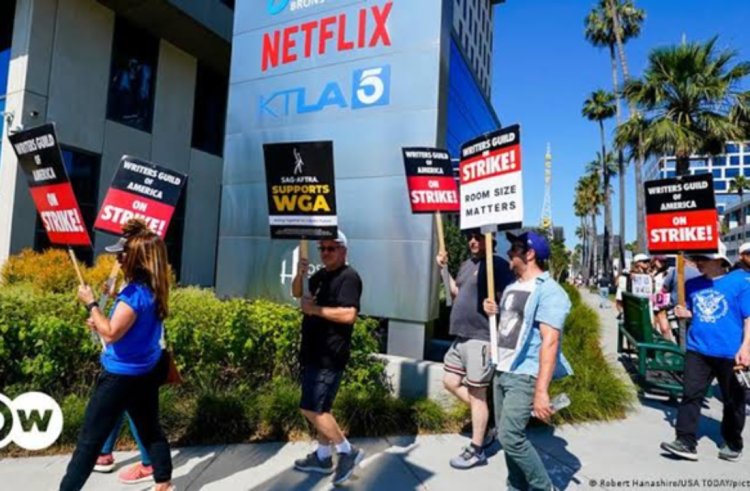The Strike's Windfall: Studios Accumulate Cash Amid Double Walkout Chaos
The Strike's Windfall: Studios Accumulate Cash Amid Double Walkout Chaos
Updated on July 29, 2023 13:09 PM by Andrew Koschiev
As Hollywood enters its earnings season amidst a double walkout, the impact of the work stoppage is becoming evident. In the short term, the strike is contributing to an increase in struck companies' bottom line however, the big question is what happens in windfall.

The ongoing strike by SAG-AFTRA and the Writers Guild of America is not without precedent, as the industry faced a similar double strike 60 years ago. The repercussions of this strike are being felt across the entire entertainment landscape, with studio executives coming to terms with the harsh reality of potentially star-less seasons and the looming possibility of content shortages.
At major streaming platforms, executives are engaged in discussions about whether to withhold completed series, considering that talents are unable to participate in promotional activities. As a result, studios are accumulating a cash hoard, which is currently having a short-term positive impact on their bottom line. The vast majority of film and TV sets are now inactive, leading to studios holding onto funds that would typically be invested in these productions.
According to estimates by Wall Street analyst firm Moffett Nathanson, the total media industry content spent in 2022 was nearly $135 billion. With the strike causing most of this expenditure to come to a halt, a considerable amount of cash is currently sitting idle, waiting for the resolution of the labor dispute to reinvigorate the industry's creative output.
Although Moffett Nathanson, in its report on May 3rd, emphasized the short-term benefits for every media company in terms of conserving cash and reassessing talent deals during the ongoing strikes, the report also cautioned about potential long-term consequences, suggesting that the strike could lead to a significant shift away from the era of Peak TV, resulting in a scarcity of English-language scripted content rather than an abundance.
The impact of the strikes on corporate financials was clearly evident when Netflix released its quarterly earnings on July 19. Initially, the company had projected its 2023 free cash flow to be approximately $3.5 billion. However, due to the effects of the strikes, Netflix increased that estimate to more than $5 billion, indicating the substantial financial implications of the ongoing labor disputes on the streaming giant's balance sheets.
Inside studio board rooms, the realization of a starless season is causing concern. Executives are grappling with the dilemma of conserving production funds while facing the potential scarcity of content to keep their pipelines running smoothly. These difficult decisions are not sparing even the most experienced executives, including Disney CEO Bob Iger, who is finding himself under immense pressure, resulting in what could be considered his toughest PR week ever.
When SAG-AFTRA, the actors' union, joined forces with the Writers Guild of America, already picketing for two months, to call for a strike against Hollywood studios and streamers on July 13, Iger took to the media to express his views. He characterized their decision as disturbing and unrealistic, reflecting the growing tension and complexity of the situation.
According to a report by Moody's senior vp Neil Begley on July 17, if the strike continues for an extended period, it could have severe consequences for entertainment giants. The prolonged strike could prove troublesome and even dire for numerous media companies in the entertainment ecosystem that heavily rely on content produced by studios. Those with minimal diversity, limited sports rights and news programming, or inadequate replacement content and financial flexibility would be particularly vulnerable.
Influencers are also grappling with the complexities of the strike, finding themselves caught between adhering to strict SAG-AFTRA rules and their need to collaborate with studios to create content. This dilemma has left them in a challenging position, with some feeling as if they are facing an ultimatum.
Looking back, the Hollywood strikes have caused significant disruption, confusion, and animosity within the industry. While the current situation is not without precedent, it poses considerable challenges for all stakeholders involved. The strike has highlighted the need for careful navigation and cooperation to find a resolution and ensure the sustainable functioning of the entertainment industry.





